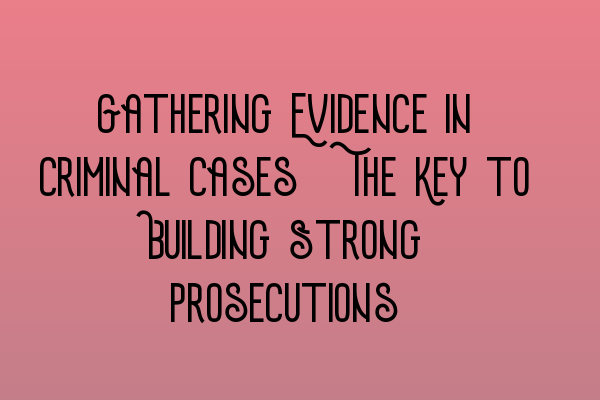Gathering Evidence in Criminal Cases: The Key to Building Strong Prosecutions
When it comes to criminal law, gathering evidence is the backbone of any successful case. It is the process of collecting and documenting information that supports the claims made by the prosecution. Evidence is crucial as it helps establish facts, prove guilt beyond a reasonable doubt, and ultimately secure a conviction.
The Importance of Gathering Evidence
Gathering evidence is essential for several reasons:
- Establishing a solid case: Whether it’s a murder, theft, or any other criminal offense, the prosecution must present a strong case before the court. Evidence acts as the foundation upon which the case is built, giving weight to the arguments presented.
- Proving guilt beyond a reasonable doubt: In criminal cases, the burden of proof lies with the prosecution. It is their responsibility to provide sufficient evidence that convinces the judge or jury of the defendant’s guilt. Without compelling evidence, it is challenging to meet this requirement.
- Protecting the innocent: While the prosecution’s goal is to secure a conviction, it is equally vital to ensure that only the guilty are convicted. Gathering accurate and reliable evidence helps differentiate between true offenders and innocent individuals who may have been wrongly accused.
The Process of Gathering Evidence
Effective evidence gathering requires a systematic approach. Here are the key steps involved:
- Identification of relevant evidence: The first step is to identify and determine the type of evidence that is pertinent to the case. This can include physical evidence, such as DNA samples or fingerprints, as well as testimonial evidence from witnesses.
- Preservation and documentation: Once the evidence is identified, it must be properly preserved and documented. This may involve collecting physical items, taking photographs, or recording witness statements. Careful documentation ensures that the evidence remains tamper-proof and can be easily presented in court.
- Chain of custody: Maintaining a clear chain of custody is essential to establish the integrity of the evidence. The chain of custody tracks the movement of evidence from its collection to its presentation in court. This ensures that the evidence has not been tampered with or compromised in any way.
- Expert analysis: In some cases, expert analysis is necessary to interpret the evidence accurately. This may involve forensic examination, DNA testing, or other specialized techniques. These experts play a crucial role in presenting complex evidence to the court and providing an unbiased opinion.
The Role of Technology in Evidence Gathering
In recent years, technology has greatly impacted the process of evidence gathering in criminal cases. It has provided new tools and techniques to help law enforcement agencies and prosecutors build stronger cases. From advanced forensic technologies to digital evidence, technology has revolutionized the field.
One significant advancement is the use of digital evidence. With the increasing reliance on technology in our daily lives, digital evidence has become a valuable source of information. It includes data from computers, cell phones, surveillance cameras, and social media platforms. Properly collecting, preserving, and analyzing digital evidence requires specialized knowledge and skills.
To stay ahead in this digital era, law firms need to adapt and embrace the latest technology. Investing in advanced tools and training their legal professionals in the nuances of digital evidence is crucial for building strong prosecutions.
Conclusion
Gathering evidence in criminal cases is a meticulous and crucial process that lays the foundation for a successful prosecution. It involves identifying relevant evidence, preserving it properly, maintaining a clear chain of custody, and sometimes seeking expert analysis. With the advancements in technology, embracing digital evidence has become paramount for building strong cases.
At SQE Criminal Law & Practice Law UK, we understand the significance of evidence gathering in criminal cases. Our team of experienced solicitors and lawyers is well-versed in the latest techniques and technologies involved in gathering evidence. If you require assistance in building a strong prosecution, our SQE 1 and SQE 2 Preparation Courses can equip you with the necessary knowledge and skills. Additionally, for SQE 1 exam practice, you can check out our SQE 1 Practice Exam Questions and SQE 1 Practice Mocks FLK1 FLK2.
For more information about SQE exam dates and our comprehensive preparation courses, visit our SQE 2 Preparation Courses and SQE 1 Preparation Courses pages. Stay ahead in the world of criminal law by ensuring you have the knowledge and skills required for effective evidence gathering.
Remember, strong evidence is the key to building successful prosecutions!
